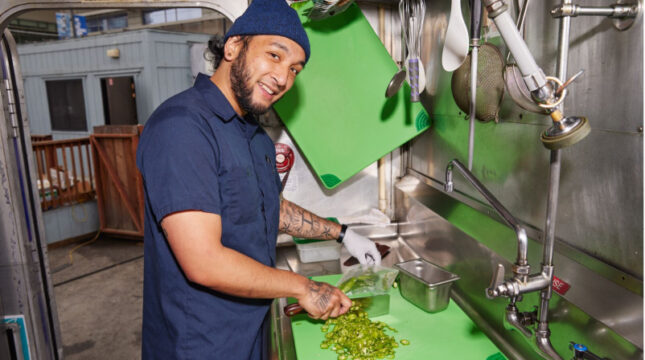Who needs Florida food manager certification?
Most food businesses in Florida must have a certified food manager on-site when food storage, preparation, or service is taking place.
This applies to all establishments with three or more employees handling food at once time and establishments serving highly susceptible populations, such as immunocompromised individuals. This may include:
- Restaurants
- Food trucks
- Caterers
- Detention facilities
- Fraternal organizations
- Schools using a contracted food service provider
- Residential facilities, such as assisted living facilities, adult day cares and hospices
Food businesses and restaurants may need multiple certified food managers on staff to cover all shifts. The manager(s) for each business must be designated in writing and must earn their Florida manager food safety certification within 30 days of being hire, according to Florida Health.
If an establishment has two or fewer employees working with food at one time and serves the general population, a certified food manager must be designated. However, they don’t have to be present at all times.
How to get Florida food manager certification
Florida employees must pass a food manager certification exam to obtain their food safety manager certification. The test must be administered by one of the following providers approved by the Florida Department of Health:
- 1 AAA Food Safety
- APS Culinary Dynamics (DBA: World Food Safety Organization)
- Certus/StateFoodSafety
- Learn2Serve (formerly 360training)
- My Food Service License
- National Registry of Food Safety Professionals
- National Restaurant Association Solutions (formerly ServSafe)
- Relish Works, Inc.
- Responsible Training/Safeway Certifications, LLC
- The Always Food Safe Company, LLC
Employees needing help preparing for the exam may use any food protection courses, study guides, or written materials available from these providers. However, employees are not required to complete any training before taking the exam.
The food safety certification exam may be taken online or in person in many cities across Florida.
To take the exam to become a certified food manager, Florida employees should plan to pay around $25 to $50. Exact costs vary by provider.
Completing a training program and the exam can cost around $75 to $100.
Exact time to complete the training and exam may vary by provider. You can expect to spend around eight hours for the training course. If you choose to review only the topics you need, you’ll spend less time.
Most people usually finish the exam in one hour or less. However, some providers, such as StateFoodSafety, have a two-hour time limit for the exam. After successfully completing the exam, certificates may be issued instantly or sent by mail.
As a restaurant or food service business owner, you must keep proof of your food service managers’ certifications on file. This information must be available upon request during inspections by the Department of Health.
Renewal is required every five years for certified food protection managers. Florida employees must retake the test to maintain their certification.
Insurance for Florida restaurants, caterers, cafes and food service
Florida business insurance is designed to protect your restaurant or food service establishment. Restaurant owners in the Sunshine State may want to consider the following insurance options:
General liability insurance
Florida general liability insurance is crucial for your business. It covers property damage or injuries to someone other than you or an employee.
Specifically for food service, general liability insurance provides coverage for foodborne illness to safeguard your business if customers get sick from contaminated food.
Workers’ compensation insurance
In Florida, workers’ compensation insurance is a must if you have four or mor employees. Your policy includes coverage for medical bills and lost wages if an employee gets hurt on the job.
Commercial property insurance
To protect your company’s physical assets, such as buildings, equipment, furniture and inventory, you’ll need commercial property insurance. It helps pay for repairs or replacements after a covered event, such as a fire or burst pipe.
Commercial auto insurance
If you or an employee is in a vehicle accident while on the job, commercial auto insurance can step in to cover costs like property damage and medical expenses.
Florida law requires all vehicles to have minimum auto insurance coverage of $10,000 in Personal Injury Protection (PIP) and $10,000 in Property Damage Liability (PDL), according to Florida Highway Safety and Motor Vehicles.
Florida food manager certification reciprocity
When a food protection manager certificate from another state is still valid, Florida recognizes it, as long as it was obtained from an approved provider in the state. This means that if an employee has successfully passed the food protection manager certification exam in a different state and the certification is still active, it will be accepted in Florida.
Florida food manager certification requirement exemptions
The food manager requirement does not apply to the following types of food service establishments:
- Bars and lounges
- Civic organizations
- Theaters
- Public and private schools where school employees operate food service
Food manager certification vs. food handlers card
Besides certified food managers, other Florida restaurant and food business employees must complete an approved food handler training program within 60 days of employment. Those who complete the program earn a food handler certificate.
Florida food handler license requirements apply to most employees at food service establishments, even if they don’t directly prepare food. This includes servers, hosts, bartenders, and on-site event coordinators.
The certified food managers are responsible for ensuring that the food handlers on staff follow food hygiene practices. Because these employees are trained in proper food preparation and handling techniques, they help protect your business by reducing the risk of foodborne illness.
How NEXT helps support Florida restaurants and food business owners
NEXT provides tailored Florida restaurant insurance policies designed for small businesses and self-employed business owners.
In about 10 minutes, you can get a quote, review coverage options and download a certificate of insurance. And if you have questions, our team of licensed insurance advisors is standing by to help.
Start a free quote with NEXT.






